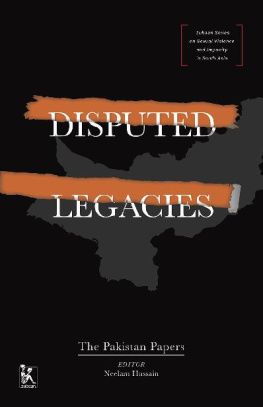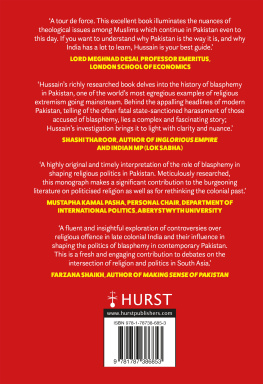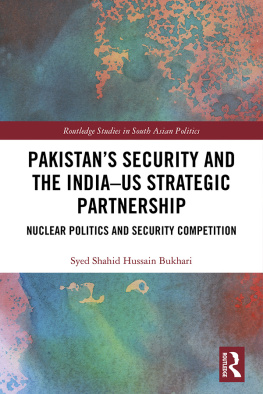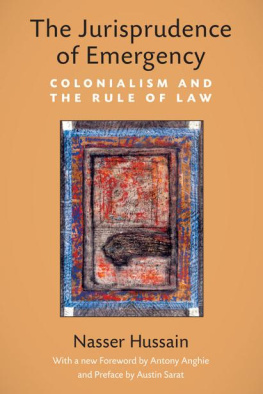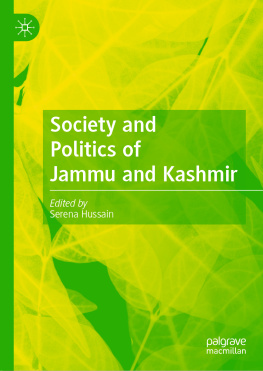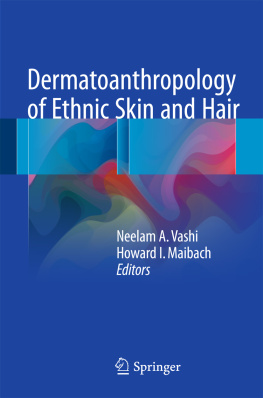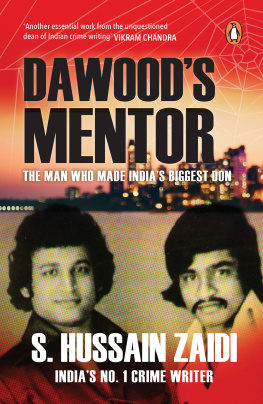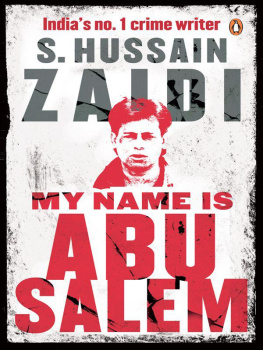Disputed Legacies
The Pakistan Papers
The Sexual Violence and Impunity in South Asia research project (coordinated by Zubaan and supported by the International Development Research Centre) brings together, for the first time in the region, a vast body of knowledge on this important - yet silenced - subject. Six country volumes (one each on Bangladesh, Nepal, Pakistan, Sri Lanka, and two on India) comprising over fifty research papers and two book-length studies detail the histories of sexual violence and look at the systemic, institutional, societal, individual and community structures that work together to perpetuate impunity for perpetrators.
Disputed Legacies focuses on Pakistan, examining law, pedagogy, medical practice and the situations that arise when 'secular' law comes into conflict with traditional practice and belief. The contributors to this volume trace the often-troubled interaction between the state and its women citizens and examine the structures and social systems that enable impunity for perpetrators of sexual violence to gain strength.
Editor : Neelam Hussain
Contributors : Sahar Zareen Bandial, Nazish Brohi, Iftikhar Firdous, Huma Qurban Fouladi, Neelam Hussain, Hooria Hayat Khan, Zainab Zeeshan Malik, Noreen Naseer, Zahaid Rehman, Fahmida Riaz, Rubina Saigol, Zahra Shah, Sarah Zaman, Afiya Shehrbano Zia, Maliha Zia
Neelam Hussain is a writer and translator. She works with the Simorgh Women's Resource and Publication Centre, and teaches English at the Lahore Grammar School in Pakistan. She is the translator of Inner Courtyard by Khadija Mastur, and coeditor of Engendering the Nation State .
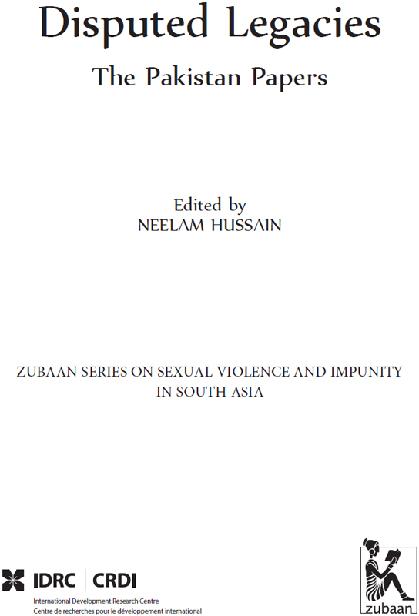
Zubaan
128 B Shahpur Jat, 1 st floor
NEW DELHI 110 049
Email:
Website: www.zubaanbooks.com
First published by Zubaan 2019
Copyright Zubaan 2019
All rights reserved
This project was undertaken with financial support provided by the International Development Research Centre, Canada
10 9 8 7 6 5 4 3 2 1
eBook ISBN: 9789385932090
Print source ISBN: 9789385932779
This eBook is DRM-free.
Zubaan is an independent feminist publishing house based in New Delhi with a strong academic and general list. It was set up as an imprint of Indias first feminist publishing house, Kali for Women, and carries forward Kalis tradition of publishing world quality books to high editorial and production standards. Zubaan means tongue, voice, language, speech in Hindustani. Zubaan publishes in the areas of the humanities, social sciences, as well as in fiction, general non-fiction, and books for children and young adults under its Young Zubaan imprint.
Printed and bound at Raj Press, R-3 Inderpuri, New Delhi 110 012
Hello Reader!
This is just a note to let you know that all Zubaan ebooks are completely free of digital rights management (that is, DRM-free), so that you can read them on any of your devices and download them multiple times. We believe that this makes for a more trouble-free and pleasurable reading experience. To be fair to our authors and to enable us to continue publishing and disseminating their work, we appeal to you to buy copies of this ebook rather than share or give it away free. Thank you for your support and cooperation. And happy reading!
Contents
Urvashi Butalia, Laxmi Murthy and Navsharan Singh
Fahmida Riaz
Translated by Zahra Shah
Neelam Hussain
Hooria Hayat Khan
Sahar Zareen Bandial
Zainab Zeeshan Malik
Sarah Zaman and Maliha Zia
Rubina Saigol
Huma Qurban Fouladi
Noreen Naseer with Iftikhar Firdous
Afiya Shehrbano Zia
Nazish Brohi
Neelam Hussain and Rubina Saigol
Neelam Hussain and Zahaid Rehman
Nazish Brohi
Zubaan Series on Sexual Violence and Impunity in South Asia
An Introduction
URVASHI BUTALIA, LAXMI MURTHY AND NAVSHARAN SINGH
The Sexual Violence and Impunity project (SVI) is a three-year research project, supported by the International Development Research Centre (IDRC), Canada, and coordinated by Zubaan. Led by a group of nine advisors from five countries (Bangladesh, India, Nepal, Pakistan, Sri Lanka), and supported by groups and individuals on the ground, the SVI project started with the objectives of developing and deepening understanding on sexual violence and impunity in South Asia through workshops, discussions, interviews and commissioned research papers on the prevalence of sexual violence, and the structures that provide impunity to perpetrators in all five countries.
The project began with some key questions and concerns. We noted that recent histories and contemporary political developments in South Asia had shown an exponential increase in sexual violence, particularly mass violence. And yet, even as such violence had increased across the region, so had the ever-deepening silence around it.
Why, for example, had the end of 25 years of violent conflict in Sri Lanka in May 2009 not resulted in an open and frank discussion about sexual violence as a weapon of war? Why had the International Crimes Tribunal (ICT) of Bangladesh, set up in 2009 to investigate and prosecute suspects for the genocide committed in 1971 by the Pakistan army and their local collaborators, paid such little attention to the question of mass rape, despite it being widely acknowledged that it had happened and many women having spoken out about it? Why did discussions on Kashmir in India or Swat in Pakistan, simply ignore the question of sexual violence? Why was caste violence, violence against sex workers and men and transgender persons barely spoken about?
Nor was silence the only issue here. Crucial to maintaining the silence wasand isthe active collusion of states in providing impunity to perpetrators, sometimes under the guise of protective laws and special powers to the armed forces, at others under the guise of nationalism. So heavily were the odds stacked against women that, until recently, very few had dared to speak out. Backed by culture, and strengthened by the state, and often with the active collusion of non-state actors, impunity then, remained largely unchallenged.
We asked ourselves if these conditions were specific to the South Asian region. Elsewhere, in many parts of the world, we noted, rape was increasingly being discussed and accepted, not only as a weapon of war, but also as a crime against humanity and as an instrument of genocide. The 1998 Akeyesu judgment by the International Criminal Tribunal for Rwanda (ICTR) provided a clear definition of rape and delineated its elements as a crime against humanity and as an instrument of genocide. In the International Criminal Tribunal for the former Yugoslavia (ICTY), jurisprudence pioneered the approach that used acts of rape and other forms of sexual violence, to include elements of other international crimes such as torture, enslavement, and persecution, which previously had not been litigated in the context of gender violence.
The Special Court for Sierra Leone (SCSL) brought into jurisprudence on violations of international humanitarian law a particular form of sexual violence prevalent in the conflict in Sierra Leoneforced marriages. In this case, forced marriage was distinguished from sexual slavery or sexual crimes and argued as a crime against humanity. Building on the progressive development of the case law for sexual and gender-based violence under ICTR, ICTY and SCSL, the Rome Statute of the International Criminal Court (ICC) includes rape and forms of sexual violence as part of the crimes of genocide, crimes against humanity, and war crimes, and specifically enumerates rape, forced prostitution, sexual slavery, forced pregnancy, enforced sterilization and prosecution on account of gender as specific crimes punishable under the statute.



